The Kidney &
Hypertension Center
| Grand Forks Location The Kidney and Hypertension Center 1451 44th Ave. S., Suite 112D Grand Forks, ND 58201 |
Fargo Location The Kidney and Hypertension Center at Dakota Gastroenterology Clinic 5049 33rd Ave South Fargo, ND 58104 |
Continuing to do what we do best: taking care of patients
 The Kidney and Hypertension Center opened its doors in 2002 offering care to patients with chronic kidney disease, kidney transplant aftercare, dialysis, and patients with hypertension (high blood pressure). With the opening of hemodialysis and peritoneal (in-home) dialysis facilities, patients are able to receive a wide range of care under one roof.
The Kidney and Hypertension Center opened its doors in 2002 offering care to patients with chronic kidney disease, kidney transplant aftercare, dialysis, and patients with hypertension (high blood pressure). With the opening of hemodialysis and peritoneal (in-home) dialysis facilities, patients are able to receive a wide range of care under one roof.
The Kidney and Hypertension Center staff includes more than 20 highly trained professionals that provide compassionate, personalized care. All providers at The Kidney and Hypertension Center have privileges at Altru Health System, and are able to care for you and your family members while you are in the hospital.
Prior to any visit, a referral specialist verifies your insurance and its coverage of service. All patients can be seen at the clinic within days of their phone call. At The Kidney and Hypertension Center, patients do come first!
Aurora Dialysis
p: (701) 757–5700
 Aurora Dialysis opened in 2008 and is the first independent, state of the art hemodialysis facility in North Dakota offering exceptional care in a warm, comforting environment. The unit contains 14 dialysis stations and has the ability to expand to 20. Each patient can relax in a reclining heated massage chair in front of a flat screen TV. Every member of our staff — nurses, technicians, dietician, and social worker — strives to offer holistic and individualized care to patients and their families.
Aurora Dialysis opened in 2008 and is the first independent, state of the art hemodialysis facility in North Dakota offering exceptional care in a warm, comforting environment. The unit contains 14 dialysis stations and has the ability to expand to 20. Each patient can relax in a reclining heated massage chair in front of a flat screen TV. Every member of our staff — nurses, technicians, dietician, and social worker — strives to offer holistic and individualized care to patients and their families.
What are dialysis and hemodialysis?
Dialysis is a way of cleansing your blood when your kidneys can no longer do the job. It gets rid of your body’s wastes, water, and electrolytes, and helps control your blood pressure.
Hemodialysis means “cleaning the blood,” and that is exactly what this treatment does. It is a procedure in which a machine filters harmful waste, excess salt, and fluids from your blood. If you have any questions regarding our services, please feel free to contact us.
Kidney Institute of North Dakota
p: (701) 795–1300
 The Kidney Institute of North Dakota (KIND) (located at The Kidney and Hypertension Center) is a peritoneal (in–home) dialysis facility which offers exceptional care and training for home dialysis patients. KIND opened in 2003 as the first independent home dialysis facility in North Dakota. Peritoneal Dialysis (PD) is an alternative to standard hemodialysis in which patients are trained to do their own dialysis at home, giving them independence and control over their disease.
The Kidney Institute of North Dakota (KIND) (located at The Kidney and Hypertension Center) is a peritoneal (in–home) dialysis facility which offers exceptional care and training for home dialysis patients. KIND opened in 2003 as the first independent home dialysis facility in North Dakota. Peritoneal Dialysis (PD) is an alternative to standard hemodialysis in which patients are trained to do their own dialysis at home, giving them independence and control over their disease.
The Kidney Institute of North Dakota employs a nursing staff, a dietician, and a social worker. Our dietician will help you develop an individual meal plan, because eating the right foods — especially foods low in sodium and phosphorus, and high in protein — can improve your dialysis results and overall health. Additionally, our social worker will help coordinate a variety of services to make sure you and your family have the necessary medical services and support.
What is peritoneal dialysis?
Dialysis is a way to artificially remove waste products and extra fluid from your body when your kidneys are no longer able to do so on their own. With peritoneal dialysis, the peritoneal membrane in your abdominal cavity, is used to filter the wastes and extra fluid from your body. Peritoneal Dialysis (PD) is an alternative to hemodialysis. Patients are trained to do their own dialysis at home, giving them independence and control over their disease.
Who needs peritoneal dialysis?
If your kidneys are failing, you may need dialysis to help control your blood pressure, remove waste products, and maintain the proper balance of fluid and electrolytes in your body. Dialysis also helps your body maintain the proper acid-base balance. Occasionally, kidney failure is caused by a specific disease. In other cases, it’s a complication of another condition, such as:
- Diabetes
- High blood pressure (hypertension)
- Kidney inflammation (glomerulonephritis)
- Inflammation of blood vessels (vasculitis)
- Polycystic kidney disease


